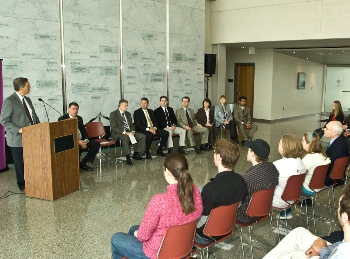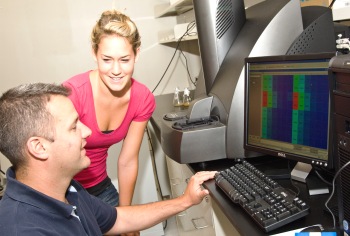- Home
- /
- UAlbany News
- /
- Release
- /
$7 Million in New Grants Awarded to UAlbany Cancer Research Center
Contact(s): Catherine Herman (518) 956-8150
 |
UAlbany Interim Vice President for Research James Dias highlights the success of the University's four-year-old Cancer Research Center at a news conference announcing $7 million in new grants to advance studies related to finding a cure for the disease. (Photo Mark Schmidt) |
ALBANY, N.Y. (October 30, 2009) -- The University at Albany Cancer Research Center (CRC) has been awarded $7 million in new funding to support its research into the causes, prevention and treatment of cancer, all with the goal of finding a cure for the disease. The CRC, which opened in October 2005, combines the University's research expertise in genomics, bioinformatics, and biomedical sciences with cutting-edge technology to explore the genetic and environmental origins of the disease and to develop new therapies.
"The success of the Cancer Research Center rests on a strong foundation of outstanding scientists involved with innovative research designed to find a cure for this devastating disease," said UAlbany President George M. Philip. "These grants allow the University to develop and evaluate cancer therapies, employ scientists and provide training for the next generation of cancer researchers."
The new grants have been awarded to four Cancer Research Center scientists.
 |
CRC researcher and assistant professor of biomedical sciences Thomas Begley (pictured with student researcher Jessica Hovancik) has garnered $2.9 million in new grants to explore environmentally induced cancers and identify targets for treatments. (Photo Mark Schmidt) |
- Thomas Begley, CRC researcher and assistant professor of biomedical sciences at the School of Public Health, was awarded $2.1 million by the National Institutes of Health (NIH) to study RNA modifications as biomarkers of environmental stress and inflammation. Begley was also awarded two NIH stimulus grants - one for $415,000 to study translational machinery in stress signaling and tumor suppression and another for $346,955 to explore the connection between tRNA methylation and the DNA damage response. The long term goal of Begley's research program is to develop methodologies to identify individuals susceptible to environmentally induced cancers and to identify targets for cancer treatments.
- Douglas Conklin, CRC researcher and associate professor of biomedical sciences at the School of Public Health, was awarded $1.25 million from NIH to study the NR1D1 gene, a recently identified Achilles' heel in breast cancer cells. Conklin was also awarded $246,800 from the Susan G. Komen Foundation and $264,177 from the U.S. Army Medical Research Acquisition Activity for analysis of NR1D1. Conklin's research may provide information on how diet and the "the night shift" contribute to breast cancer and may lead to therapies that target an aggressive form of the disease.
- Chittibabu Guda, CRC researcher and assistant professor of epidemiology and biostatistics, was awarded $946,875 from NIH to catalog the subcellular and suborganellar proteomes of sequenced genomes. Guda's research aims to create a better understanding of the spatial organization and the function of proteins in the cell that work together. The outcome of this project will benefit any field of biomedical research involving the function of proteins, including cancer.
- JoEllen Welsh, CRC researcher and Empire Innovations Professor in environmental health sciences, received a two-year stimulus grant for $996,333 to study how dietary factors protect cells from environmental agents that can cause cancer. Welsh was recently awarded a $275,000 grant from NIH to continue her studies linking vitamin D and breast cancer. The studies in Welsh's lab are designed to clarify the actions and requirements for vitamin D in cancer prevention.
The Center also recruited scientist Ramune Reliene from the University of California Los Angeles (UCLA) to its research team. Reliene joined UAlbany as an assistant professor in the School of Public Health's Department of Environmental Health Sciences in September 2009. Reliene, who received her doctorate from the Swiss Federal Institute of Technology Zurich in Switzerland, studies the environmental causes of cancer. Reliene's addition expands the scientific portfolio of the Center, advancing its ability to conduct research and provide training related to understanding the genetic and environmental causes of cancer.
The basic research mission of the Center is focused on the underlying biology associated with tumor initiation and progression, and the development and evaluation of chemopreventive regimens and therapeutic approaches for common cancers; it fosters the training of graduate students and postdoctoral fellows in cancer biology. The Center houses fully staffed, comprehensive, state-of-the-art research facilities, and benefits from its affiliation with UAlbany's School of Public Health and the Wadsworth Research Laboratories of the New York State Department of Health. It is the only academic cancer research center in North America with strong ties to a school of public health.
The Cancer Research Center, a major component of the University's life sciences research endeavors, is located on the University at Albany's 87-acre East Campus, which is anchored by the School of Public Health and also serves as home to established and start-up biotech firms, as well as Tech Valley High School.
Private donations of more than $1 million are helping to bridge information gap between the CRC laboratories and the public. With the strength of more than 1,000 individual donors, the CRC has launched several innovative educational initiatives, including the inaugural Hogarty Family Foundation Lecture series, designed to educate the public on the latest developments in cancer prevention and treatment.
Follow the University at Albany on Facebook and Twitter.
![]() For more news, subscribe to UAlbany's RSS headline feeds
For more news, subscribe to UAlbany's RSS headline feeds
Educationally and culturally, the University at Albany-SUNY puts "The World Within Reach" for its 18,000 students. An internationally recognized research university with 58 undergraduate majors and 128 graduate degree programs, UAlbany is a leader among all New York State colleges and universities in such diverse fields as public policy, nanotechnology and criminal justice. With a curriculum enhanced by 300 study-abroad opportunities, UAlbany launches great careers. For more information about this globally ranked University, visit www.albany.edu. For UAlbany's extensive roster of faculty experts, visit www.albany.edu/news/experts.shtml.


